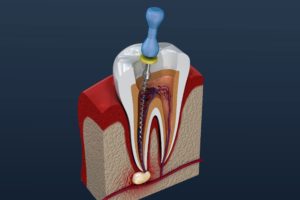Why Do I Need Root Canal Retreatment?
May 18, 2022
 According to the American Association of Endodontists, 25 million root canals are performed annually. The procedure is designed to save severely damaged or infected teeth from extraction. Root canal therapy has over a 95% success rate, offering a long-term solution that can last for decades to a lifetime; however, some patients need to have the procedure repeated. Although it’s rare, there are situations when root canal retreatment is necessary. Here’s what you need to know to save your tooth.
According to the American Association of Endodontists, 25 million root canals are performed annually. The procedure is designed to save severely damaged or infected teeth from extraction. Root canal therapy has over a 95% success rate, offering a long-term solution that can last for decades to a lifetime; however, some patients need to have the procedure repeated. Although it’s rare, there are situations when root canal retreatment is necessary. Here’s what you need to know to save your tooth.
When is Root Canal Retreatment Required?
As with any procedure, there’s a risk the treatment won’t go as expected, which can be caused by various factors, including:
- Complicated Root Anatomy: Some patients have complicated root systems, which can cause bacteria to hide in hard-to-reach places. Patients with narrow, curved, or complex canals are more likely to require retreatment.
- Delayed Crown Placement: A temporary crown is meant to serve as a short-term solution. If there was a significant delay in placing the permanent restoration, bacteria may have infected the vulnerable tooth.
- Salivary Contamination: If a restoration doesn’t completely protect the sealed tooth, saliva can seep underneath and contaminate it.
- New Decay: Decay can occur under the restoration, which can lead to a new infection in the tooth.
- Damaged Restoration: A crown or filling can fail over time, causing bacteria to attack the underlying tooth.
- Tooth Damage: If the tooth cracks, fractures, or suffers other damage, it can result in a new infection.
What Can I Expect with Retreatment?
Root canal retreatment is similar to the initial procedure. The restoration is removed and your dentist will clean out the root canals. They will use a local numbing agent, so you won’t feel anything during the process. After the tooth has been cleaned out and any new decay has been removed, it will be sterilized and sealed with a special material called gutta-percha. A new restoration will be placed over your tooth, restoring its health, function, and appearance.
How Long Does Retreatment Last?
Your tooth can stay strong and healthy for a lifetime with the proper maintenance. You can avoid future complications by:
- Brushing and Flossing: Brush your teeth twice daily and floss every night. Pay extra attention when cleaning where the crown meets the gum line. Consider using an antimicrobial mouthrinse to kill any bacteria left behind by brushing and flossing.
- Watch What You Eat: Eat a diet that’s limited in sugars and starches. Avoid chewing hard or sticky foods with your restoration.
- Break Bad Habits: It’s best to stop smoking, avoid using your teeth in place of scissors, and don’t chew on inedible objects.
- Visit Your Dentist: Schedule a cleaning and checkup every 6 months.
With the right care at home and from your dentist, your tooth can continue to serve you for many years to come.
Dr. Javier Ortiz
Dr. Ortiz earned his dental degree at the University of Puerto Rico and has completed additional training at Tufts University. He has completed advanced education in endodontics, specializing in root canal retreatment. If you are having issues with a previous root canal, contact our office today to request your consultation.
No Comments
No comments yet.
RSS feed for comments on this post.
Sorry, the comment form is closed at this time.
